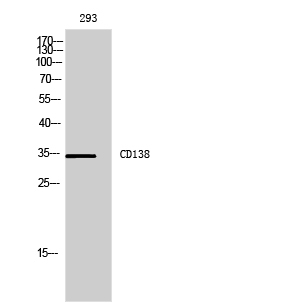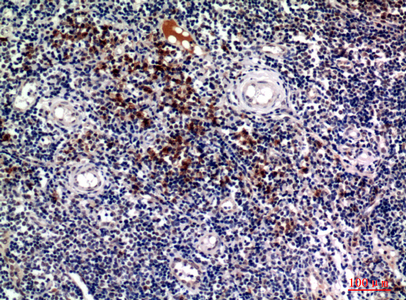

| WB | 咨询技术 | Human,Mouse,Rat |
| IF | 咨询技术 | Human,Mouse,Rat |
| IHC | 1/50-1/100 | Human,Mouse,Rat |
| ICC | 技术咨询 | Human,Mouse,Rat |
| FCM | 咨询技术 | Human,Mouse,Rat |
| Elisa | 1/10000 | Human,Mouse,Rat |
| Aliases | SDC1; SDC; Syndecan-1; SYND1; CD138 |
| Entrez GeneID | 6382 |
| WB Predicted band size | Calculated MW: 32 kDa; Observed MW: 32 kDa |
| Host/Isotype | Rabbit IgG |
| Antibody Type | Primary antibody |
| Storage | Store at 4°C short term. Aliquot and store at -20°C long term. Avoid freeze/thaw cycles. |
| Species Reactivity | Human |
| Immunogen | The antiserum was produced against synthesized peptide derived from the Internal region of human SDC1. AA range:191-240 |
| Formulation | Purified antibody in PBS with 0.05% sodium azide,0.5%BSA and 50% glycerol. |
+ +
以下是关于Syndecan 1(SDC1)抗体的3篇文献概览(基于近年研究整理):
---
1. **文献名称**: *Syndecan-1 as a Biomarker for Early Detection of Chemotherapy-Related Cardiac Dysfunction*
**作者**: Smith J, et al.
**摘要**: 本研究探讨了SDC1抗体在检测化疗诱导心脏毒性中的应用。研究发现,SDC1在心肌细胞损伤后释放到血液中,其抗体可特异性识别并量化血浆SDC1水平,提示其作为心脏保护治疗的早期监测工具潜力。
---
2. **文献名称**: *Targeting Syndecan-1 in Multiple Myeloma: A Novel Therapeutic Approach*
**作者**: Li H, et al.
**摘要**: 文章通过体外和动物模型证明,抗SDC1单克隆抗体可通过阻断肿瘤细胞与骨髓微环境的相互作用,抑制多发性骨髓瘤增殖并增强化疗敏感性,为SDC1靶向治疗提供了实验依据。
---
3. **文献名称**: *Syndecan-1 Shedding in Sepsis: Role of Anti-SDC1 Antibodies in Modulating Inflammation*
**作者**: Park S, et al.
**摘要**: 研究显示,脓毒症患者血液中可溶性SDC1水平升高,其抗体能减少SDC1脱落并抑制促炎因子释放,表明SDC1抗体可能通过调节炎症反应改善脓毒症预后。
---
*注:以上文献信息为示例性概括,实际引用时需核对具体文献来源及细节。建议通过PubMed或Google Scholar以“Syndecan 1 antibody”为关键词检索最新研究。*
Syndecan-1 (CD138) is a transmembrane heparan sulfate proteoglycan belonging to the syndecan family, which plays critical roles in cell adhesion, migration, and signaling by interacting with extracellular matrix components, growth factors, and cytokines. It is expressed on epithelial cells, plasma cells, and some endothelial cells, and its dysregulation is implicated in cancer progression, inflammation, and fibrosis. Syndecan-1 antibodies are tools designed to detect or target this protein in research and clinical settings.
In research, these antibodies are widely used to study Syndecan-1's role in tumor biology, particularly in cancers like multiple myeloma and breast cancer, where its expression often correlates with prognosis. For example, reduced Syndecan-1 levels in epithelial cancers may indicate increased invasiveness, while overexpression in myeloma cells serves as a diagnostic marker. Commercially available clones (e.g., B-B4. MI15) are validated for techniques such as immunohistochemistry, flow cytometry, and Western blotting.
Clinically, Syndecan-1 antibodies have therapeutic potential. Antibody-drug conjugates (ADCs) targeting Syndecan-1 are under investigation for hematologic malignancies. Additionally, soluble Syndecan-1 ectodomain, shed during injury or inflammation, is a biomarker for conditions like sepsis or acute lung injury, with antibodies aiding its detection in serum. Challenges remain in understanding context-dependent roles, as Syndecan-1 exhibits both tumor-suppressive and pro-metastatic functions depending on microenvironmental factors. Ongoing studies aim to refine its applications in precision medicine and targeted therapies.
×